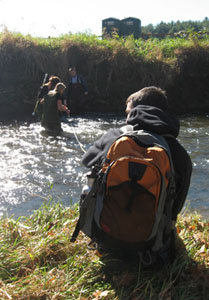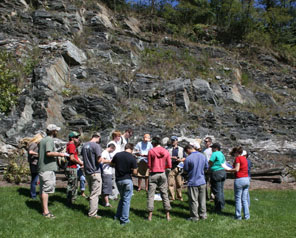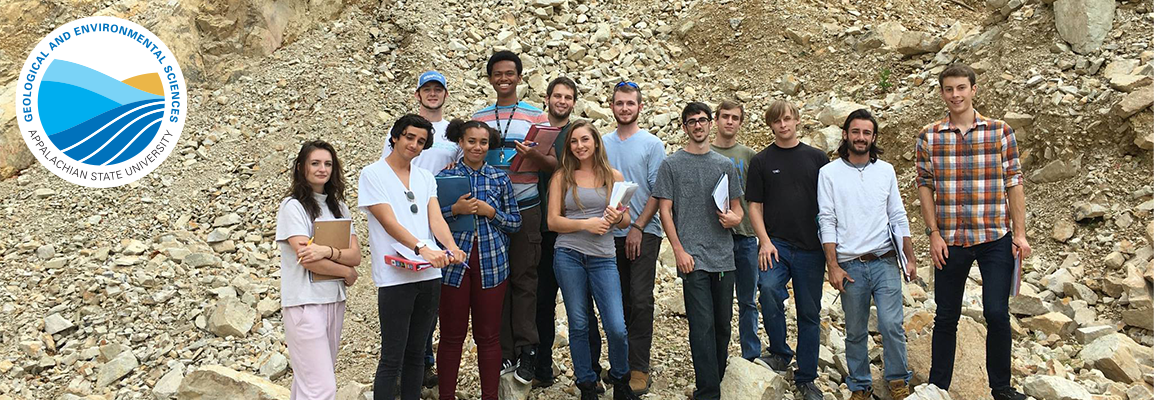Geology minors typically take the following courses:
 one course in Introductory Geology (GES 1101, 1102, 1103, 1104, or 1105)
one course in Introductory Geology (GES 1101, 1102, 1103, 1104, or 1105)- Evolution of the Earth (GES 2250)
with 6 semester hours at or above the 2000 level (excluding GLY 3520), and 3 semester hours at any level. A minimum of 9 hours must be 'in residence," i.e. courses taken through ASU (can include study abroad, ASU online courses, etc.). Courses typically open to minors include:
- Dinosaurs then and now (GES 1842)
- Energy Extraction in Appalachia (GES/AS 2301)
- Geomorphology (GES 3333)
- Geoarchaeology (GES 3680)
- Issues in Environmental Geology (GES 3703)
- Introduction to Geophysics (GES/PHY 3160)
- Principles of Paleontology (GES 3025)
- Environmental Regulation and Enforcement (GES 3110)
- Hydrogeology (GES 4630)
- Engineering Geology (GES 4705)
Introductory and General Education Course Offerings
The GES Department has a number of courses within the General Education Program's Science Inquiry Themes and Integrated Learning Experience Themes:
Restless Planet: Earth, Environment, and Evolution (Science Inquiry)
Introduction to Physical Geology (GES 1101) - Introduction to the composition, origin, and modification of Earth materials through the study of the Earth's interacting dynamic systems; study and application of the scientific method with reference to the principles of geology as demonstrated through use of case histories and laboratory material. Lecture three hours, laboratory two hours. Offered Fall, Spring, and Summer; Global Learning Opportunity (GLO) course
Introduction to Historical Geology (GES 1102) - A study of the historical and biological aspects of the science of geology – tectonic models for understanding earth structure and lithospheric history, the physical and paleontological bases for understanding geologic time and dating rocks, biological principles relating to the evolution of organisms revealed in the fossil record, facts and theories of biological evolution, a survey of the evolution of organisms through time, the geologic history of North America, and discussion of the scientific aspects of the scientific-religious controversy of evolution vs. creationism. Lecture three hours, laboratory two hours. Offered Fall, Spring

Environmental Change, Hazards, and Resources (GES 1103) - A survey of the chemical and physical processes that change the Earth's crust and surface creating geologic hazards and environmental problems for people; human perturbations of the environment that directly and indirectly affect geological change and human life, such as mining, waste disposal, and agricultural practices; and the principles of origin, distribution, availability, environmental Geology consequences of use, and exploration of the Earth's mineral and water resources. Lecture three hours, laboratory two hours. Offered Fall, Spring, and Summer
Global Environmental Change (Science Inquiry)
Water: Mountains to Sea (GES 1104) - A study of the interaction between terrestrial water and geological phenomena. The course applies the scientific method to the study of the continental components of the hydrologic cycle. It also focuses on the interaction of water with the rock and plate tectonic cycles. Lecture three hours, laboratory two hours. Offered Fall and Summer; Global Learning Opportunity (GLO) course
Life, Earth, and Evolution (Science Inquiry)
Introduction to Historical Geology (GES 1102) - A study of the historical and biological aspects of the science of geology – tectonic models for understanding earth structure and lithospheric history, the physical and paleontological bases for understanding geologic time and dating rocks, biological principles relating to the evolution of organisms revealed in the fossil record, facts and theories of biological evolution, a survey of the evolution of organisms through time, the geologic history of North America, and discussion of the scientific aspects of the scientific-religious controversy of evolution vs. creationism. Lecture three hours, laboratory two hours. Offered Fall, Spring
The Blue Planet (Science Inquiry)
Water: Mountains to Sea (GES 1104) - A study of the interaction between terrestrial water and geological phenomena. The course applies the scientific method to the study of the continental components of the hydrologic cycle. It also focuses on the interaction of water with the rock and plate tectonic cycles. Lecture three hours, laboratory two hours. Offered Fall and Summer; Global Learning Opportunity (GLO) course
Oceanography (GES 1105) - A study of physical, chemical, biological, and geological oceanography and their interrelationships. Lecture three hours, laboratory two hours. Offered Spring and Summer
Appalachian Mountains: Community, Culture, and Land (Integrated Learning Experience)
Energy Extraction in Appalachia: Past, Present Future (GES/AS-2301) - This interdisciplinary course covers the environmental, geological, historical, cultural, social, political, and economic aspects of energy extraction and production (coal, natural gas, and emerging energy technologies) in the Appalachians. Major emphasis will be on making connections between these disparate topics, with a focus on how the geologic history of the Appalachians impacts policy, politics, and other current events. No prerequisites. Offered Spring, cross listed with Appalachian Studies AS 2301.
How We Know What We Know About the Past: Method, Evidence, Knowledge (Integrated Learning Experience)
Dinosaurs: Then and Now (GES 1842) - Perhaps no fossil animals are more familiar than the so-called "terrible lizards," the dinosaurs. Paleontology is, by definition, a blend of geology and biology, and this course will examine dinosaurs through both disciplinary lenses, as well as considering the history of dinosaur science and the prevalence of dinosaurs in popular culture. This class will survey all aspects of dinosaur paleontology, considering them as fossil organisms and examining their geological, temporal, and current and paleogeographic distribution. Offered Fall
